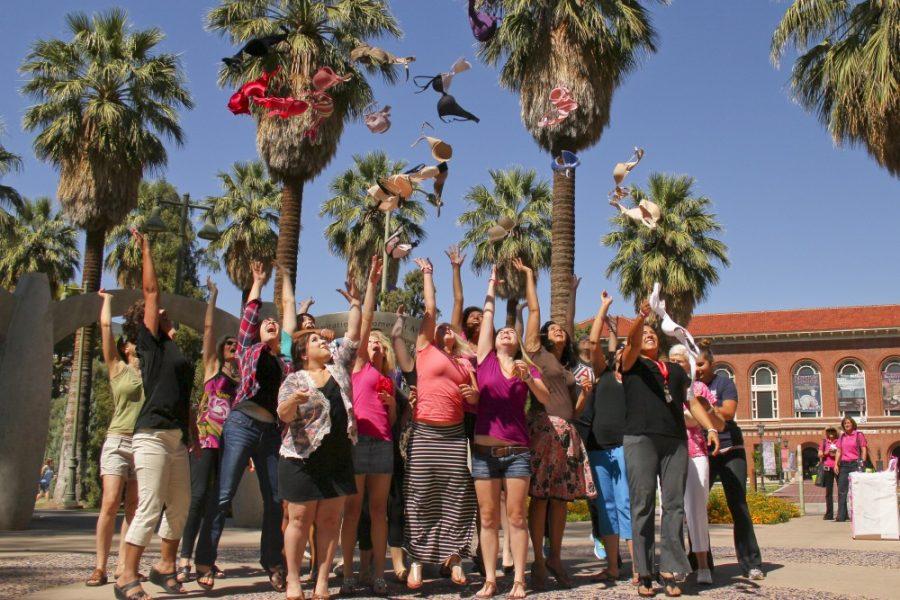Women of all ages cheered while tossing their bras up into the air at the Women’s Plaza of Honor yesterday afternoon to kick off the beginning of Breast Cancer Awareness Month.
Susan G. Komen for the Cure Southern Arizona will be spending the entire month of October raising awareness about breast cancer, and its Southern Arizona Affiliate teamed up with The Bra Recyclers to encourage the recycling of gently used and new bras.
Joining the women at the event was UA theatre arts senior and Olympic Silver medalist Brigetta Barrett.
“The cause is very close to my heart,” Barrett said. “My mother is a survivor of breast cancer and my grandmother lost her battle to it. Breast cancer is not a disease, but it’s a fight, and women are getting stronger and stronger every day.”
The Bra Recyclers, based in Gilbert, is a textile-recycling company specializing in recycling bras. They have more than 50 organizations around the country, said Elaine Birks-Mitchell, the company’s chief executive officer.
“We found out there was a huge need for bras in our immediate community for women in shelters and shelter programs,” Birks-Mitchell said. “Many of the organizations need the bras and do not have them. I figured if I had a lot of bras, many other women must have bras to donate as well.”
Throughout Southern Arizona during the month of October, women are encouraged to drop off their bras, and a campus drop-off location will be established in the near future. Once collected, the bras will be delivered to the Bra Recyclers after the duration of the month. The company will make a monetary donation to the Southern Arizona Affiliate of Susan G. Komen for every pound of bras recycled during the month.
While similar efforts have been happening for a number of years, this is the first time that Susan G. Komen and the Bra Recyclers have partnered up.
“We want people to take away from this the fact that breast cancer touches women of all ages,” said Gillian Drummond, the communications consultant with the Susan G. Komen for the Cure’s Southern Arizona branch. “I am hoping that UA students will take away that not only will breast cancer touch at least one woman in their lifetime, but also that it is not an ‘old-lady’ disease.”
Filmmaker Hannah Glasston, a UA radio and television graduate and current director of Etherton Gallery, was runner-up in a short film competition held earlier this year by the Southern Arizona branch of Susan G. Komen for the Cure. The film featured a mass of bras and women’s undergarments and the song “Mammogram” by contemporary folk singer-songwriter Jean Bayou. Bayou is also a UA alumna and her song was played during the tossing of the bras.
“My grandmother, great-grandmother and aunt are all survivors of breast cancer because they were able to get treatment,” Glasston said. “Jean’s song ‘Mammogram’ is very inspirational to people who watch the video.”
The event lasted for 30 minutes and featured a DJ, refreshments and speeches given by women who have been involved with the awareness process, including Barrett. Public health sophomore Laura Gallardo was one of the students who participated in the event.
“This is very important to me because my mom was diagnosed with breast cancer when I was 10 and my boyfriend’s mom was diagnosed last year,” Gallardo said. “I am very aware of breast cancer as it has affected me very closely.”
Craig Fones, a UA alum and volunteer for the Komen foundation,lost his father to breast cancer on October 15, 2010. His mission was to spread awareness that men can also get breast cancer. During the last month of his life, Fones’ father lost his voice completely, so he took over his father’s mission and message, and has been volunteering with Komen for the past three years.
“Breast cancer can happen to men,” Fones said. “They don’t think they can get it because they don’t have breasts. This is way I started my campaign, ‘Check the Pecs.’ Plus, men are stubborn and you have to force them at times to go to the doctor’s.”
Drummond said that for every dollar raised, 75 cents stays in Southern Arizona and 25 cents funds international breast cancer research. Throughout the year, the Komen foundation uses donations to make grants to educate and raise awareness about breast cancer, and for health centers and clinics that treat under-insured and uninsured women.
“Early detection is the best detection,” Drummond said. “If you are eligible for a mammogram, you should definitely be examined. Remember to know your body well.”









